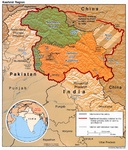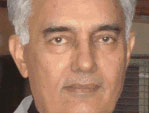India is always on the lookout to side step the issues, never solve the problems
By Iftikhar Momin
India remains a diehard proponent of bilateral interaction for addressing intractable issues afflicting Indo-Pak relations; particularly the festering issue of Kashmir. This strategy of stonewalling, however, is fast becoming irrelevant due to the US led intervention in Afghanistan and the fight against extremism in FATA being conducted in the backdrop of a prominent Indian foot print. India is manifestly under outside pressure to facilitate anti terrorist operations in Af-Pak Region by ratcheting down tension and resume Composite Dialog Process (CDP) with Pakistan. What reflects this outside inducement most eloquently is the flip-flops by the Indian Premier over the dilemma of whether to commence dialog in the format of CDP or to deflect the third party interference to exploit the once in a lifetime opportunity for cutting Pakistan down to size.
Ever since the signing of the Simla Agreement in Jul 72, Kashmir has been pushed by India to the sidelines on the pretext of being a bilateral Issue. This strategy has served India well through decades but post 9/11 era has seen rise of new actors – and their interests that are not necessarily aligned with Indian imperatives. The core of the Indian propaganda that Pakistan is a state sponsoring terrorism and masterminding ‘cross border terrorism’ in Kashmir now stands effectively neutralized. In contrast it is Indian promotion of terrorism in Afghanistan and in Pakistani hinterland as well as FATA which is under focus. The Indian sponsored proxy war on Pakistan’s western flank has begun to have an impact on US/NATO operations for the worse and consequently, not to India’s liking, the pressure on her to come to resume CDP is beginning to mount.
Terrorism has remained the fulcrum of Indian negotiating tactics vis-à-vis Pakistan but the things

stand transformed and a foreign pressure to set the CDP, free of this crippling bondage is becoming manifest. Understandably India finds it difficult to let go of this time tested ploy despite repeated declarations by the Indian Premier to decouple the CDP negotiations from the acts of terrorism occurring in India. His very recent offer of ‘unconditional talks’ with Pakistan , offered during his visit to the IHK , with the riding clause for Pakistan to bring its terrorists under ‘effective control’ is an example of how the Indian establishment is trying to ride two horses at one time.
The CDP commenced in Feb 2004, following the rolling back of Operation PARKARAM in the autumn of 2002, following a tense face off extended over ten months. Eight issues clustered around the core issue of Kashmir including Siachin, Sir Creek, Wullar Barrage, CBMs, Terrorism and related subjects were planned to be tackled. Four rounds of talks were conducted till the Mumbai Attacks of Nov 2008 brought the process to a complete halt. Not that the process was free from earlier hiccups. Recurring domestic incidents of terrorism had continued to be exploited by India to regulate the pace of the dialogue.
In Jul 2006 attacks on Mumbai suburban train network saw a suspension of the process. Threads were picked up, ostensibly on third party intervention, following the meeting between President Musharraf and Prime Minister Manmohan Singh on the sideline of NAM Summit in Havana. The joint statement in Havana called upon not to link terrorism concerns to the progress on CDP; calling for the institution of the joint anti terror mechanism to jointly investigate and implement counter terror effort. Predictably contents of the Joint Communiqué never got effectively translated into ground action. The joint statement emerging after the meeting of Indian and Pakistani Prime Ministers on 16 Jul 2009, on the sidelines of NAM Summit at Sharm-el-Sheikh was to exhibit the same pattern. It read: “Action on terrorism shouldn’t be linked to CDP and these should not be bracketed” also conceding that “terrorism is the main threat to both countries”. However within a few hours of the release of the joint statement the Indian diplomatic establishment and its Prime Minister were struggling to wriggle out of the commitments made in face of furor that the statement had raised back home. Prime Minister Singh retracted from the committed position; declaring that the peace talks would remain on hold unless the perpetrators of the Mumbai tasks were taken to task by Pakistan. His recent statement from IHK to hold “unconditional talks” yet linking them to Pakistan’s dismantling of ‘terrorist infrastructure’ underscores the cross currents in the Indian strategic thinking; how to balance the outside pressure for commencement of CDP with an uncontrollable itch to destabilize Pakistan from ‘Station Afghanistan’.
At a time when Pakistan is seized with the issue of stamping the fires of terrorism that patently bear deep Indian involvement; an Indian refusal to come to negotiating table to discuss bilateral issues, including joint control of the scourge of terrorism speaks of a malicious mindset. The potency of threat is evident from the fact that even when Pakistan needs every soldier in the fight against terrorism; no chances can be taken by thinning out forces from Eastern borders where a strong vigil remains a strategic and operational compulsion.
Indian reluctance to engage Pakistan diplomatically is primarily caused by a misplaced realization that she has little to gain from the negotiating table. The ground situation is, however, changing fast and not to India’s advantage. Her façade of being a terror victim is losing credibility with international power brokers who are becoming aware of India’s role in sponsoring terrorism in Afghanistan and Pakistan. Kashmir’s linkage with Afghanistan-Pakistan Regional scenario now stands fully exposed where progress on Kashmir Issue is considered essential to forge a response to threat of terrorism relentlessly raking the Region. India may not admit but her case for bilateralism stands much diluted. How to avoid the Third Party involvement within the framework of the CDP for resolving outstanding issues with Pakistan , particularly Kashmir is a question that will seize Indian policy planners’ attention in days to come.

After graduating from college, I joined Pakistan Army and was commissioned in a Tank Regiment. I am a veteran of the Indo-Pakistan war. After leaving the Army, I joined IT as a profession. I was hired by Kuwait Air Force And Air Defence as an Adviser to computerize its entire operation. Here I was the Chief Coordinator of the Project, Kuwait Automated Support System (KASS). It was a state-of-the-art leading-edge technology where we established over 500 online terminals network with dedicated voice and data communications. It had Satellite linkups to connect with other systems and track the inventory movement for KAF & AD. On this project, I was coordinating with the US Navy, IBM World, AT&T, and Martin Marietta for the development, deployment, and operation of the KASS. Writing has always been a passion for me, been writing for 25 years for various newspapers and periodicals. Now for the last four years, I have formed my virtual Think Tank, Opinion Maker. Here we have some renowned writers from Pakistan and abroad who contribute regularly that’s helping the world opinion in some way. I am a keen golfer may not be a good one but play on a daily basis. I am also fond of using the camera to picture nature and people.
ATTENTION READERS
We See The World From All Sides and Want YOU To Be Fully Informed
In fact, intentional disinformation is a disgraceful scourge in media today. So to assuage any possible errant incorrect information posted herein, we strongly encourage you to seek corroboration from other non-VT sources before forming an educated opinion.
About VT -
Policies & Disclosures -
Comment Policy
Due to the nature of uncensored content posted by VT's fully independent international writers, VT cannot guarantee absolute validity. All content is owned by the author exclusively. Expressed opinions are NOT necessarily the views of VT, other authors, affiliates, advertisers, sponsors, partners, or technicians. Some content may be satirical in nature. All images are the full responsibility of the article author and NOT VT.
 stand transformed and a foreign pressure to set the CDP, free of this crippling bondage is becoming manifest. Understandably India finds it difficult to let go of this time tested ploy despite repeated declarations by the Indian Premier to decouple the CDP negotiations from the acts of terrorism occurring in India. His very recent offer of ‘unconditional talks’ with Pakistan , offered during his visit to the IHK , with the riding clause for Pakistan to bring its terrorists under ‘effective control’ is an example of how the Indian establishment is trying to ride two horses at one time.
stand transformed and a foreign pressure to set the CDP, free of this crippling bondage is becoming manifest. Understandably India finds it difficult to let go of this time tested ploy despite repeated declarations by the Indian Premier to decouple the CDP negotiations from the acts of terrorism occurring in India. His very recent offer of ‘unconditional talks’ with Pakistan , offered during his visit to the IHK , with the riding clause for Pakistan to bring its terrorists under ‘effective control’ is an example of how the Indian establishment is trying to ride two horses at one time.



